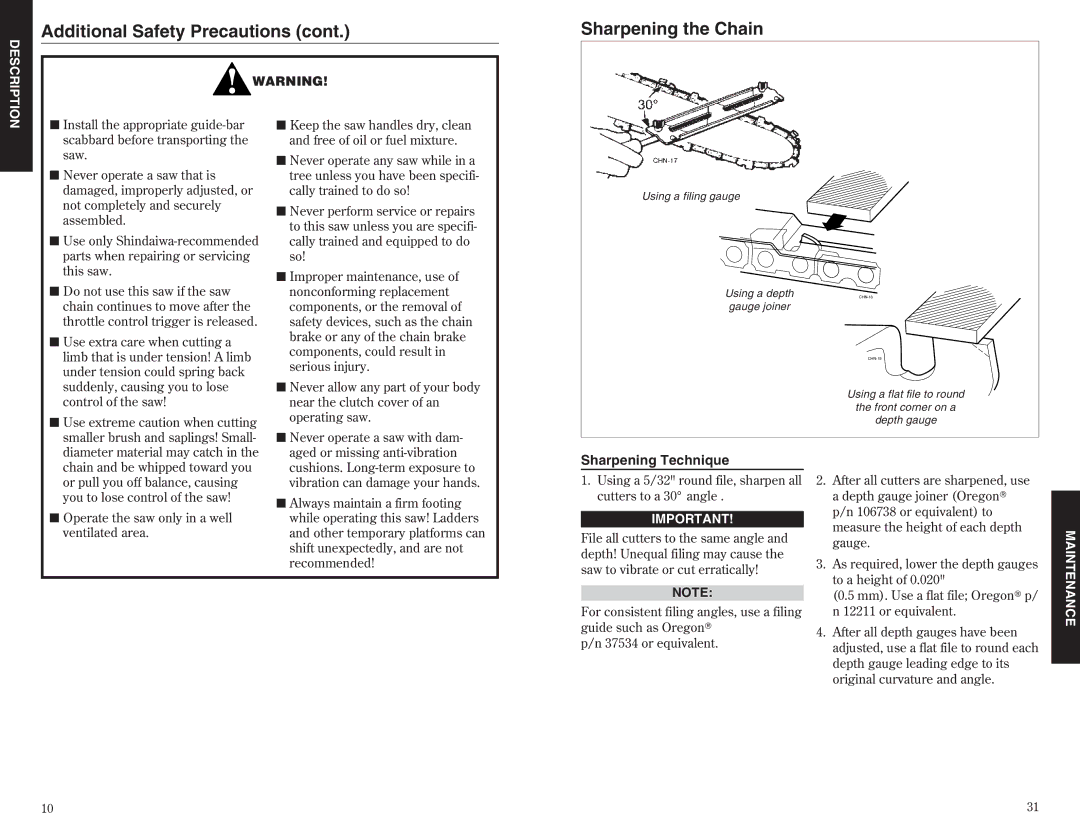
DESCRIPTION
Additional Safety Precautions (cont.)
WARNING!
Sharpening the Chain
■ Install the appropriate |
scabbard before transporting the |
saw. |
■ Never operate a saw that is |
damaged, improperly adjusted, or |
not completely and securely |
assembled. |
■ Use only |
parts when repairing or servicing |
this saw. |
■ Do not use this saw if the saw |
chain continues to move after the |
throttle control trigger is released. |
■ Use extra care when cutting a |
limb that is under tension! A limb |
under tension could spring back |
suddenly, causing you to lose |
control of the saw! |
■ Use extreme caution when cutting |
smaller brush and saplings! Small- |
diameter material may catch in the |
chain and be whipped toward you |
■ Keep the saw handles dry, clean |
and free of oil or fuel mixture. |
■ Never operate any saw while in a |
tree unless you have been specifi- |
cally trained to do so! |
■ Never perform service or repairs |
to this saw unless you are specifi- |
cally trained and equipped to do |
so! |
■ Improper maintenance, use of |
nonconforming replacement |
components, or the removal of |
safety devices, such as the chain |
brake or any of the chain brake |
components, could result in |
serious injury. |
■ Never allow any part of your body |
near the clutch cover of an |
operating saw. |
■ Never operate a saw with dam- |
aged or missing |
cushions. |
Using a filing gauge
Using a depth | |
gauge joiner |
|
Using a flat file to round
the front corner on a
depth gauge
Sharpening Technique
or pull you off balance, causing |
you to lose control of the saw! |
■ Operate the saw only in a well |
ventilated area. |
vibration can damage your hands. |
■ Always maintain a firm footing |
while operating this saw! Ladders |
and other temporary platforms can |
shift unexpectedly, and are not |
recommended! |
1.Using a 5/32" round file, sharpen all cutters to a 30° angle .
IMPORTANT!
File all cutters to the same angle and depth! Unequal filing may cause the saw to vibrate or cut erratically!
NOTE:
For consistent filing angles, use a filing guide such as Oregon®
p/n 37534 or equivalent.
2.After all cutters are sharpened, use a depth gauge joiner (Oregon® p/n 106738 or equivalent) to measure the height of each depth gauge.
3.As required, lower the depth gauges to a height of 0.020"
(0.5 mm). Use a flat file; Oregon® p/ n 12211 or equivalent.
4.After all depth gauges have been adjusted, use a flat file to round each depth gauge leading edge to its original curvature and angle.
MAINTENANCE
10 | 31 |
